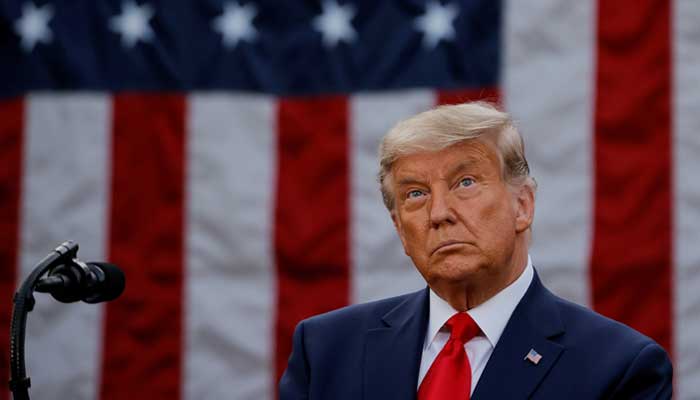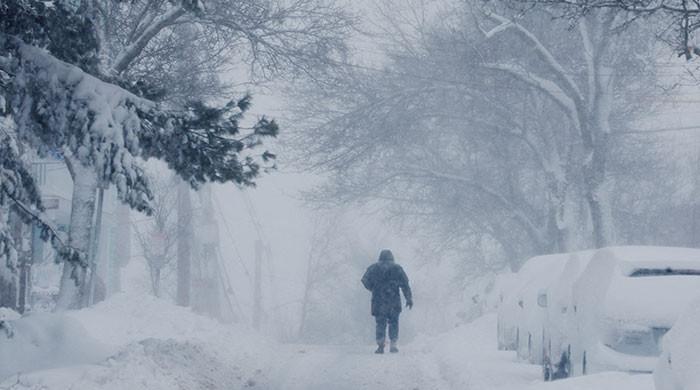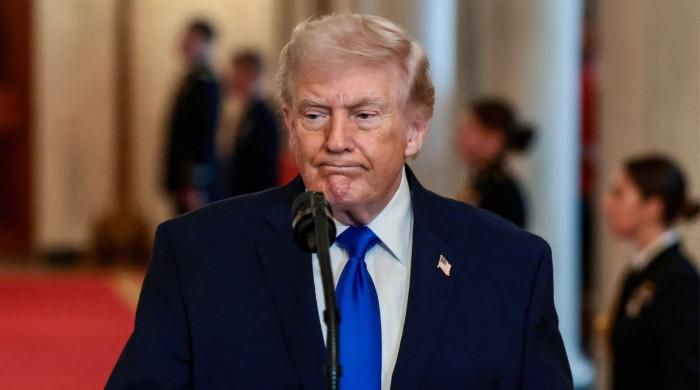Can Trump still continue as US president despite losing the elections?
Most election scholars say the odds of Trump ultimately being named president are exceedingly slim
November 20, 2020

WILMINGTON: President Donald Trump's latest strategy for attacking the legitimacy of the US election appears to be focusing on a bold power play of persuading Republican state lawmakers to overturn the vote in states won by his Democratic challenger Joe Biden.
To succeed, Trump would have to surmount considerable legal hurdles, overcome public condemnation and sway lawmakers in at least three states to break with democratic norms.
Most election scholars said the odds of Trump ultimately being named president are exceedingly slim.
But the laws have never been tested like this before.
Biden won the election, didn't he?
Biden won by a comfortable 306-232 margin in Electoral College votes.
The process for formalising his win, however, will take place in the coming weeks.
In the United States, a candidate becomes president by securing at least 270 “electoral” votes.
Electors are party loyalists who pledge to back the candidate who won the popular vote in their state and are allotted among the states based roughly on population.
Typically, a state certifies a Republican or Democratic slate of electors based on which candidate won the popular vote.
Electors convene on December 14 to formally select the president, and the results are sent to Congress to tally on January 6.
On January 20, one presidential term ends and the next begins.
What is Trump's strategy?
The president has repeatedly claimed without providing evidence that the election was stolen. His campaign has filed lawsuits in closely contested states such as Pennsylvania where he is trying to stop officials from certifying the vote. Trump's lead lawyer Rudy Giuliani said on Thursday that more lawsuits were on the way.
Delaying or blocking the state certification process could clear the way for legislators to appoint electors pledged to Trump, even in states where Biden won the popular vote.
A person familiar with the Trump campaign’s legal strategy said it has become a “more targeted approach towards getting the legislators engaged.”
"The real fight, if there is to be one, is over the certification of results and then watching to see if state legislatures in these Republican states ... are willing to begin talking about this kind of shocking power play," said David Daley of FairVote, which advocates for election reforms.
What is the role of state lawmakers?
Usually, the secretary of state or governor certifies the vote. State legislators generally have no role in the process.
But Trump supporters have seized on language in the US Constitution that says each state shall appoint electors "in such manner as the Legislature thereof may direct."
"Everyone should remember the central role of state legislatures in picking a president," Newt Gingrich, a former speaker of the US House of Representatives, said on Twitter on Saturday. "The Legislature, not the Secretary of State, Governor or court."
The Trump campaign took this argument a step further on Wednesday, claiming in a lawsuit that the administration of Pennsylvania's election was so flawed that state officials had usurped the power of the legislature to set election rules.
The campaign's proposed fix: let the state's Republican-controlled legislature appoint electors and declare Trump the victor of the state, even though Biden won the popular vote.
This is a difficult legal argument since the campaign is asking a court to override the vote of millions of Americans because of relatively minor alleged voting irregularities.
Obscure federal law
An obscure federal law provides another opening for lawmakers to appoint Trump electors in states won by Biden.
That law allows state legislators to appoint electors if voters "failed to make a choice" on Election Day. Legal experts said legislators could pass a resolution saying the election was so marred by irregularities that the outcome could not be determined and then proceed to appoint their own electors.
This is particularly true in Wisconsin, Michigan and Pennsylvania, where the legislature is controlled by Republicans while the governors and secretaries of state are Democrats.
"There’s a lot of reasons to think that’s illegal and improper and politically infeasible," said Paul Smith, a professor at Georgetown and a vice president for the Campaign Legal Center, a voter advocacy group. "But some people are talking about it for sure."
Uncharted territory
Should legislators appoint electors pledged to Trump in states Biden won, it's possible that two sets of electors from one state will meet on December 14 and cast competing ballots —- one for Trump and one for Biden.
Academics have sketched out several scenarios of what could happen next, though it's unchartered territory. When Congress meets on January 6 to count the votes, it's possible Vice President Mike Pence, as president of the Senate, may throw out both sets of a state's electors. Or Congress could end up picking the next president.
"That’s what is so dangerous about this entire process which has been predicated on norms for so long that it has disguised just how rickety the system is if someone wanted to play this kind of hardball," said FairVote's Daley.











